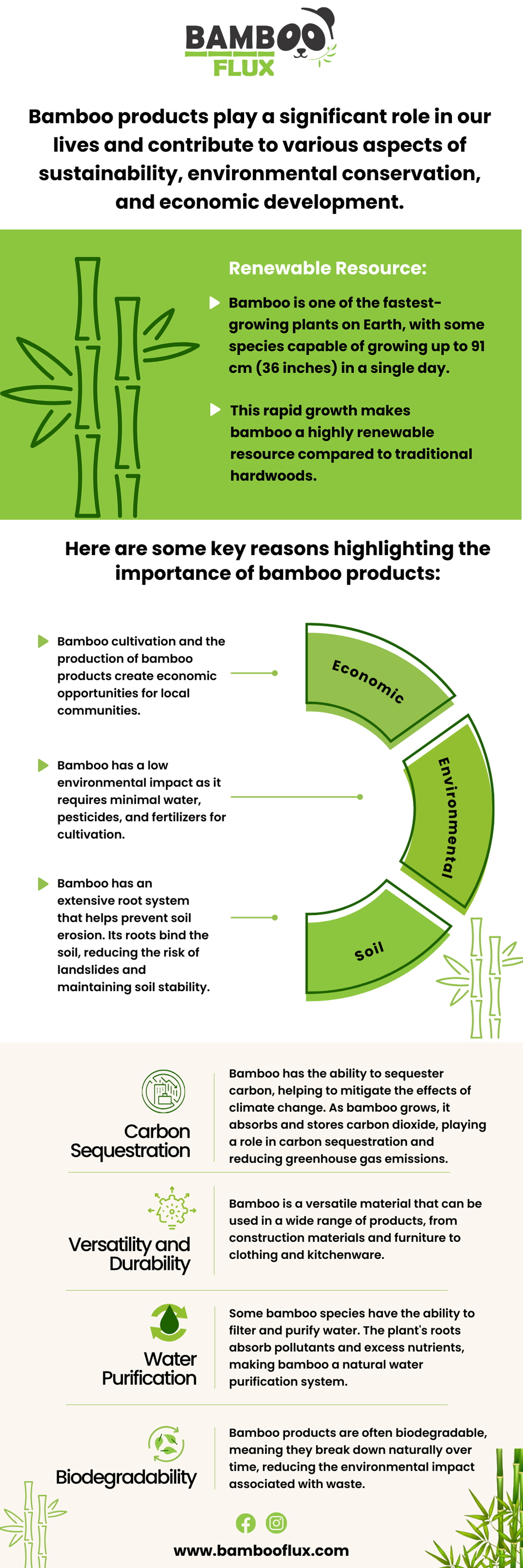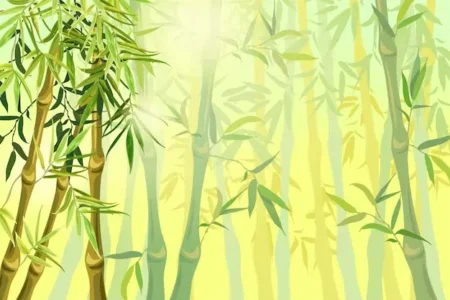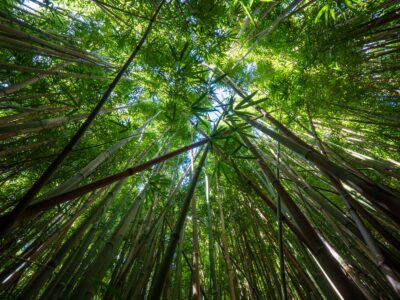In a world dealing with environmental issues, finding sustainable options is significant. The beautiful traditional hardwoods are used a lot, but that harms our environment. Cutting down forests and using up these resources hurts the health of our planet.
Bamboo is a great option to consider for preventing deforestation. Too much usage of traditional wood leads to cutting down trees, losing animal habitats, and reducing the variety of plants and animals. However, bamboo grows exceptionally quickly, so it acts as an alternative to traditional wooden resources.
Bamboo’s Impact on Our Everyday Lives:
- Renewable Resource:
The rapid growth of bamboo, with certain species achieving an impressive 91 cm (36 inches) in a single day, directly confronts a critical issue. Traditional hardwoods struggle to match this pace, resulting in deforestation and habitat loss. In contrast, bamboo emerges as a highly renewable resource, replenishing at an extraordinary rate. This not only eases pressure on existing forests but also offers a sustainable option for various industries, including the production of organic bamboo products. As we delve into the pivotal role of bamboo and its products in our lives, it becomes clear that this plant is crucial to a more environmentally friendly and harmonious future.
- Environmental Conservation:
Bamboo’s swift development not only showcases its durability but also underscores its minimal environmental impact. It stands as a symbol of sustainability, reflecting a dedication to conscious living. Beyond its growth traits, bamboo serves as a quiet ally in combating climate change. With increased oxygen release and carbon dioxide absorption compared to many plants, bamboo significantly enhances air quality and aids in climate change mitigation. Integrating bamboo into our daily lives makes us custodians of a greener, more sustainable future. It’s more than a resource; it’s a lifeline connecting us to the core of responsible coexistence with nature.
- Biodiversity and Ecosystem Preservation:
Embarking on a journey from nature’s abundance to integral elements of our daily existence, bamboo emerges as a silent architect dedicated to biodiversity and ecosystem preservation. Beyond mere resources, bamboo plantations evolve into dynamic ecosystems, playing a pivotal role in the conservation of diverse species. In contrast to the uniformity of monoculture crops, bamboo thrives through symbiotic coexistence, fostering a flourishing haven within its serene groves. Here, insects dance amid resilient bamboo shoots, birds seek refuge in rustling leaves, and small mammals find niches among sturdy stems in a lush tapestry of life.
- Soil Conservation:
Bamboo’s resilient roots penetrate far into the ground to withstand strong winds or downpours. Their complex web binds the earth firmly, serving as a natural fortification. This binding quality is essential for lowering the risk of landslides as well as preventing soil erosion, particularly in regions where these geological difficulties are common.
Bamboo has an impact on soil stability that goes beyond its immediate environment. Bamboo creates a protective layer for the soil wherever it grows, maintaining its structure and making sure that the base of our ecosystems is resilient to the erosive forces of the environment.
- Versatility and Durability:
Bamboo’s journey from the center of impenetrable forests to the center of our houses is evidence of its resilience and flexibility. Bamboo is a prominently sustainable choice in the construction industry. Its strength and resilience make it an excellent material for structural elements, giving architectural marvels a hint of natural grace in addition to strength. Bamboo’s adaptability is endless, ranging from exquisite furniture to towering bamboo buildings. Bamboo furniture tells tales of sustainability, while bamboo cookware radiates elegance and usefulness.
Bamboo products are not only helpful but also durable allies on our path to a more environmentally conscious and sustainable way of living, thanks to the fibers of the plant that weave tales of resilience. By embracing bamboo’s adaptability and toughness, we start a harmonic relationship with the natural environment, where every use speaks to the echoes of a more robust, greener planet.
- Carbon Sequestration:
Carbon dioxide is taken up by the bamboo shoots and stored in their fibers with every unfurling shoot. In addition to improving the bamboo’s growth, this organic process helps to lower the amount of greenhouse gases in the environment significantly.
As bamboo grows, it becomes a living example of how nature can transform. Bamboo’s capacity to sequester carbon goes well beyond its practical uses and assumes an essential ecological significance. By selecting bamboo, we join forces with a sustainable solution that not only strengthens ecosystems’ resilience but also significantly contributes to guiding our world toward a more balanced and environmentally friendly future. Bamboo is the star of the delicate dance of nature, its astonishing capacity to sequester carbon, giving it a symphony of optimism and environmental resilience.
- Economic Opportunities:
A quiet revolution in economics is underway in the heartlands of the bamboo world. People find not just a crop but also a lifeline when they cultivate bamboo, which is where the trip starts. By bringing life to rural environments, planting bamboo helps local farmers make a living. When the bamboo reaches maturity, the harvesting season brings with it jobs and a means of subsistence for workers who must carefully gather robust shoots.
The processing of bamboo is also included in the economic tapestry. Communities find a solid financial foundation in the many stages of bamboo consumption, from producing handmade goods to manufacturing construction materials. Expert hands from bamboo into beautiful patterns, and local artisans bring valuable works of art to life. The potential for a better, more resilient future grows along with the bamboo sector.
- Water Purification:
Some bamboo species reveal a fantastic skill: they can filter and cleanse water. The roots of the bamboo plant come into focus as we explore the nuances of this natural phenomenon.
By drawing impurities and surplus nutrients out of the water, bamboo roots act as nature’s purification system. Bamboo has an inherent characteristic that makes it a live, breathing system for purifying water. Bamboo becomes a valuable ally in areas facing problems with water quality, providing a natural and sustainable solution.
The simplicity of this method is what makes it so beautiful. Impurities are drawn up and absorbed by the bamboo’s complex root structure, leaving behind cleaner, more transparent water. Bamboo’s ability to filter water is a monument to the beauty of nature’s design, in contrast to traditional systems that could rely on energy-intensive procedures.
- Biodegradability:
Bamboo products present a vital substitute for the enduring environmental problems associated with synthetic materials due to their natural biodegradability. As we include bamboo into your way of life, we join a circle of natural regeneration. Bamboo gently bows out and returns to the soil in a peaceful and environmentally benign manner, in contrast to its synthetic competitors that persist in the environment for extended periods. This natural ability to decompose reduces trash and promotes a more peaceful relationship with the environment while also lessening the load on landfills.
With every biodegradable bamboo product, we can take a tiny but significant step toward reducing the environmental effects of our decisions and creating a society where innovation and nature coexist peacefully.
- Aesthetic and Cultural Value:
Talented craftspeople may transform bamboo into exquisite traditional crafts that perfectly capture the spirit of cultural expression. Bamboo is used to communicate stories, beliefs, and customs through everything from intricate sculptures to woven baskets. Bamboo’s significance in culture is further reinforced by its use in rites and ceremonies. This hardy plant forms a part of the spiritual fabric of communities, from the rhythmic beats of bamboo instruments to the decorations of sacred areas.
Bamboo’s role in many facets of human life is elevated by its aesthetic appeal as well as cultural and historical significance. Bamboo becomes a live example of the timeless grace of cultural legacy as we are able to recognize its beauty and incorporate it into our daily activities, crafts, and surroundings.
In conclusion, the uses of bamboo goods go far beyond their practicality. It stands for a dedication to living an eco-friendly and sustainable lifestyle that benefits economic growth, environmental preservation, and the health of the earth as a whole. We at BambooFlux share this dedication by offering bamboo-based products that fit in well with your everyday routine. Celebrate bamboo’s brilliance, where necessity and nature coexist peacefully.






